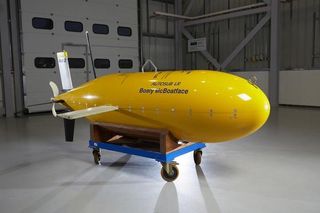Boaty McBoatface FTW! Internet-Named Sub Finally Gets a Mission

Last year, when the Natural Environment Research Council launched an online poll to name the organization's new research vessel, the internet responded with "Boaty McBoatface." Now, Boaty is set to begin its first Antarctic mission.
Boaty is not the U.K. polar research vessel for which the poll was launched, however. Though the name won the poll, the council had final say and christened the ship "Sir David Attenborough," in honor of the famed naturalist. The democratically selected name "Boaty McBoatface" went instead to a new type of autonomous underwater vehicle (AUV), according to the council.
The AUV embarks for Antarctica this week (March 17) on the British Antarctic Survey (BAS) research ship RRS James Clark Ross, as part of the DynOPO (Dynamics of the Orkney Passage Outflow) expedition, according to a statement from the BAS. Able to travel at a depth of up to 3.73 miles (6 kilometers) beneath sea ice, Boaty will collect data on the water flow and turbulence in the depths of the Southern Ocean. Scientists will use this data to study how the ocean changes due to global warming. [50 Amazing Facts About Antarctica]
Boaty will specifically explore the Orkney Passage, a region of the ocean that's 2.17 miles (3.5 km) deep. The Passage acts as a "choke point" in the water's flow, where the researchers expect changing winds above the ocean to affect the warming water, said project lead scientist Alberto Naveira Garabato.
"We will measure how fast the streams flow, how turbulent they are and how they respond to changes in winds over the Southern Ocean," Naveira Garabato, a professor of earth and ocean sciences at the University of Southampton in England, said in the BAS statement. "Our goal is to learn enough about these convoluted processes to represent them in the models that scientists use to predict how our climate will evolve over the 21st century and beyond."
In the future, Boaty will be deployed to collect data on everything from acoustic signals to chemical compounds, the Guardian reported. The whimsically named UAV will also serve an educational purpose. The U.K. National Oceanography Center created a cartoon Boaty, and a full-size inflatable, to help teach kids about ocean exploration, according to the center.
Original article on Live Science.
Sign up for the Live Science daily newsletter now
Get the world’s most fascinating discoveries delivered straight to your inbox.

Most Popular


